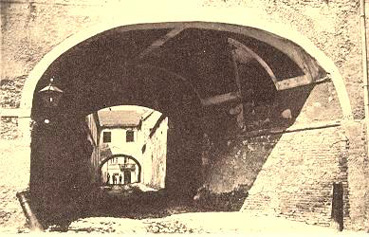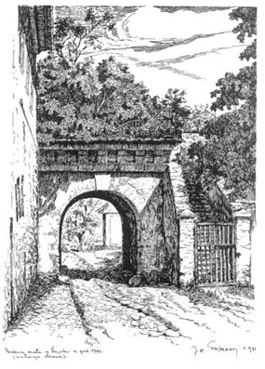By early April 1945, the eastern front of Croatia was under strong pressure from Tito's partisan units, now called the People's Liberation Army of Yugoslavia (NOV). The Independent State of Croatia (NDH) had a fascist government led by Poglavnik Dr. Ante Pavelic and proponents of Ustasa political regime had formed an alliance with Hitler Germany in April 1941.
North my hometown of Osijek the Russian armies were advancing through Hungary and, joined by the newly formed Bulgarian and Hungarian People's Armed forces, were on their way to Vienna in Austria already. Early April 1945 the German bridgehead on Drava River some 40 kilometers up_river from Osijek collapsed without much notice by the town's population. One was used having the actual front line along Drava River during past four months. In the morning of April 13, 1945 we learned that the 1st Domobran Battery of howitzers was ordered to ready to move out.
I had joined this Domobran unit late in December 1944 as a Junior Lieutenant and my first duty was of an advanced observer to become Officer in charge of the guns later. I did have time to call upon my parents before we moved out of Osijek. All my efforts were in vain to avoid the retreat with the battery. I had hoped either to establish a contact with the partisans in order to join them or finding a stead to hide until the war was over. Fear of endangering my family made both of possibilities unrealistic. Early evening of April 13, I left my hometown with the Battery marching south at first, but turning west and back to the front line of the Drava River the next day.

The Franciscan Street in Fortress of Osijek
OZNA 3 Military Police's Dungeons in the ex-Franciscan Cloister
In airplane attack at Nasice my horse was mortally wounded and I had to shoot it. My only school colleague also a Junior Lieutenant in the Battery had deserted too. The Croatian Army's retreat westwards as it had been declared officially had been turning gradually into a general exodus. The traffic on roads thickened with fleeing civilians and other units of the Croatian and German Armies. Near Mali Grdjevac, about halfway between Osijek and Zagreb, the Battery was involved in a fierce night battle with an unidentified enemy. Here I have had a very close escape from my exposed observation post from which I had been directing the gunfire during that night. On another occasion near Zabno I had nearly escaped to be captured by the enemy again. I had been out at the observation post when I was very nearly cut off from Battery by the approaching partisans' unit.
Late afternoon on May 8th the Battery left Krizevci marching out on a road leading further North of Zagreb. Yugoslav Peoples' Army had liberated Zagreb the Croatian capital that same day. Soon after leaving we have learned that the war was over in Europe too. Now everyone's hope was to rush westwards in order to surrender to any Western Allies' unit rather than to Russians or Bulgarians. Thus the Croatian retreat went on into Slovenia.
At our heels from East were the Partisans including some units of Yugoslav People's Army following and pushing at us The Russians and Bulgarians were just across Drava River North of us. Some Croatian army units in particular of the Ustasas made several attempts to break through from the constantly closing trap around us. The Croatian politicians and high rank civilians followed in the general exodus hoping to get alive into American or British captivity. We heard from hearsay about massacres of Croatians who had managed crossing Drava River at Dravograd. Some British Army units at Bleiburg had sent back thousands of Croats who surrendered to them by handing them over to Tito's Army units.
The Battery's commander left without any instruction or even notice on the afternoon of May 14th. Some time afterwards I had decided to surrender to the Partisans feeling that it was our best choice under the prevailing circumstances. I hoped to be taken and treated like a Prisoner of War in accordance to the Geneva Convention after all. Tito's Peoples Army had offered safe conduct to all Domobran' POW pared to desert the fascist regime in Croatia before. I had ordered to leave behind about a hundred horses, obliterate all ammunition and dismantle the four howitzers. After the midnight I led Battery's service men back along the road we had come several hours before.
At the wee-hours I have all surrendered in pitch darkness to an almost invisible Liberator's unit well before daybreak of May 15. At dawn I put on some of civilian cloth or rather what one called "mufti", a mixture of civvies and uniform. In due course I lost almost all of my belongings including my spare boots in an enforced "exchange of goods" by several armed and shabby clothed "liberators". Later we had been marched back to Slovenjgradec arriving there in an immense orchard turned into an open-air camp. The orchard was full to the bream with thousands of Prisoners of War.
On May 17, 1945 the roughly 40.000 prisoners were ordered to leave that camp thus starting their Death March later to be known as the CRUCIFIXION WAY OF CROATS. From the very beginning we were subjected to enormous physical strain, nearly unbearable hunger and thirst. Cruel and ruthless attacks by the guards and the hostile population resulted in very many Croats' casualty on route. Whoever came through was badly broken in body and spirit. When horrors of World War II had ended in Europe the Croats had still to endure many more and even worse of horrors. Too many persons died of weakness and desperation, others were simply murdered in following days and weeks after the Piece reined in Europe already.
Near Celje I lost my riding boots in another of many forced "exchanges". Unable to find any footwear I walked over 450 kilometers in bare feet sometimes wrapped in bandages whenever I could find any suitable material. I have begged for food, for water, for a piece of cloth endlessly. I have cried and cursed my fate, cursed on all individuals in power and on the whole humanity too. At the age of barely 20 years i have seen people collapse and perish, stealing from and hurting indiscriminately weak ones, to torture and kill recklessly and cold-bloodedly.
Zvonko pointing to a closed airvent of the OZN3 prison's underground cell he was shut in.
I have also seen heroism, commiseration and pity in few cases. I have met people who helped me without thinking of the danger for them. I have met a group of women in Daruvar who by sheer courage and determination forced our guards allowing them to make our suffering more bearable. In a group of some twenty former Domobran officers reached Osijek on June 2, 1945 after 16 days of forced deadly march at last. We were still Prisoners of War and were told having to pass a certain RE-EDUCATION prior to become acceptable as officer in JNA. We were all considered to be War Criminals without any trials or even inquiry.

The Watergate from inside of the Citadel fortification wall. Engraving
by J. Gojkovic 1939.
On my 20th birthday my father managed to extract me from the marching column and have me transferred into custody of OZNA 3, the military political police, for further interrogation. There I have found the luxury of a cell to myself with a dry wooden floor to sleep on. At first I was treated as a War criminal until few days later after hours of interrogation which ended me writing down my CV. Few weeks later I was told that I would be going to an unknown place for a re-education. After passing such a course I could be accepted serving as an officer of Yugoslav People's Army. After a month's imprisonment in dungeons of the Old Fort of Osijek I was transferred to a POW's camp at distant East of Serbia. In spite of weighing half of what I had been before I was slowly feeling better especially when I met few former comrades among prisoners in POW's camp at Kovin.
Zvonko standing in front of the Water gate inside the Citadel of Osijek
September 1999.
Forty years later, I decided to put them down in writing the manuscript titled "RE-EDUCATION or Four Months in the Life of a Young Man" in the years 1984/5. Thus freed myself of all bitterness but also with the aim of telling the following generations about war's cruelties and brutalities, which could trigger off in any person. Another fifteen years later I wrote this book in Croatian considerable changes in political and social occurred in my home country. I do hope that young Croatian generations would learn about the destinies of their grandfathers and fathers of which they never have heard or learned anything about.
Issued by Zvonko Springer in Anif, March 1999.